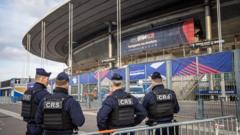The match, set for Thursday evening, comes a week after violent incidents where Maccabi fans were attacked following their game against Ajax. Nuñez described the event as high-risk, emphasizing the need for heightened security in light of the ongoing unrest linked to the Israeli-Palestinian situation. To further bolster security, nearly 1,600 private security personnel and an elite anti-terrorism unit will support the local forces.
Expected attendance will be low, with only a limited number of Israeli fans likely to travel to the capital after the Israeli government advised against it. Politicians across Europe have raised alarms over a reported resurgence of antisemitism, prompting President Emmanuel Macron's decision to attend the match as a show of solidarity with the Jewish community. He will be accompanied by Prime Minister Michel Barnier, as well as former presidents François Hollande and Nicolas Sarkozy.
Spectators are warned to undergo identity checks, and local establishments will close early due to security precautions. Although France has successfully hosted high-profile events since previous disturbances, political tensions linger, particularly with far-left groups calling for match cancellations due to accusations against Israel.
Amidst growing protests from pro-Palestinian groups coinciding with the match, relations between Macron and Israeli officials have become increasingly strained, reflecting an ongoing debate about France's stance on the Israeli-Palestinian conflict. As the situation evolves, it remains uncertain how this match will impact both local and broader geopolitical dynamics.
Expected attendance will be low, with only a limited number of Israeli fans likely to travel to the capital after the Israeli government advised against it. Politicians across Europe have raised alarms over a reported resurgence of antisemitism, prompting President Emmanuel Macron's decision to attend the match as a show of solidarity with the Jewish community. He will be accompanied by Prime Minister Michel Barnier, as well as former presidents François Hollande and Nicolas Sarkozy.
Spectators are warned to undergo identity checks, and local establishments will close early due to security precautions. Although France has successfully hosted high-profile events since previous disturbances, political tensions linger, particularly with far-left groups calling for match cancellations due to accusations against Israel.
Amidst growing protests from pro-Palestinian groups coinciding with the match, relations between Macron and Israeli officials have become increasingly strained, reflecting an ongoing debate about France's stance on the Israeli-Palestinian conflict. As the situation evolves, it remains uncertain how this match will impact both local and broader geopolitical dynamics.























